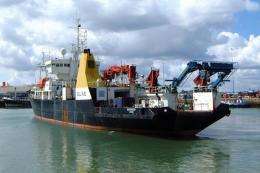Discovery on the prowl for the ocean's vital nutrients

Normally we think of metals in our water supply as a bad thing, but when it comes to trace amounts of metals welling-up from the ocean’s depths we should count ourselves lucky that they appear.
That's because metals such as iron and zinc are essential to all kinds of marine life – they act rather like a 'fuel' that powers ocean ecosystems. On 17 October an Oxford University-led expedition will set sail for the South Atlantic to study these ‘micronutrient’ metals.
'Because they are present in seawater at such low concentrations they are difficult to measure but with this new expedition we hope to revolutionise our understanding of the metal 'micronutrient' cycle and gain insights into the past, present and future of Earth's climate,' explains Gideon Henderson of Oxford University’s Department of Earth Sciences and the Oxford Martin School, who is leading the UK-GEOTRACES consortium.
Gideon will lead a team of 24 scientists from 10 UK institutes aboard the Royal Research Ship Discovery, one of NERC’s research vessels, collecting samples and carrying out experiments on the 39-day cruise from Cape Town to Montevideo.
The RRS Discovery will head to the South Atlantic where the ocean is particularly rich in life, but where the sources of micronutrients are a mystery. By collecting samples, and making a wide range of measurements both onboard and back in the lab, the research team hopes to learn how the metals enter and leave the ocean, and how their abundance in seawater influences marine biology.
Much of our understanding of past climate comes from measurements of marine sediments but understanding how climate information is reflected in the chemistry of the sediments is essential if we are to interpret this evidence correctly.
Understanding the cycle is also vital if we are to assess whether proposed geo-engineering schemes, such as 'seeding' the oceans with iron to increase their carbon uptake, might work.
'Changes in marine ecosystems also have a wider impact: these ecosystems are vital for food production, biodiversity, international development, tourism, and pollution management,' Gideon tells me.
'Any changes in the cycling of micronutrients in the South Atlantic will have an impact not just on the local area but also on the natural resources, economies and standard of living of countries around the world.'
Provided by Oxford University


















